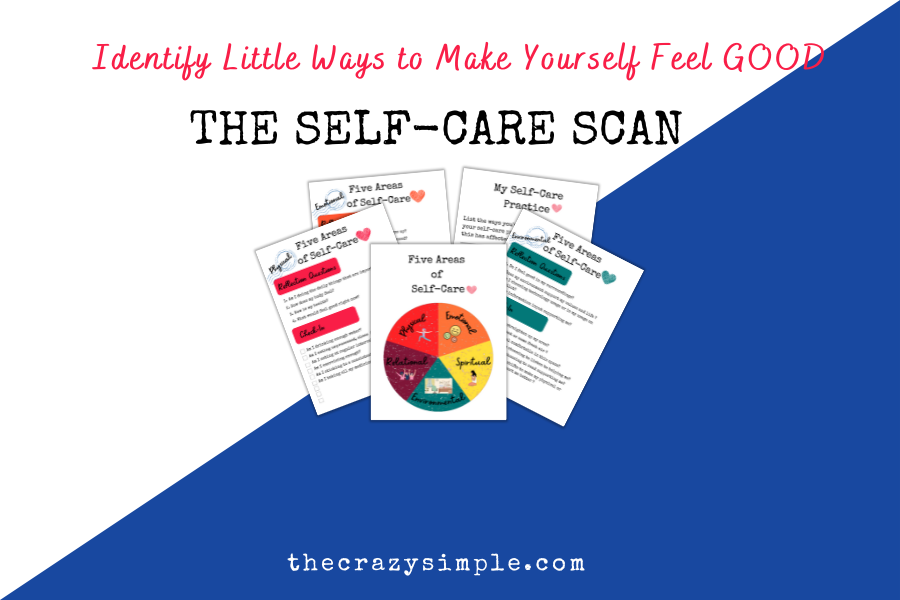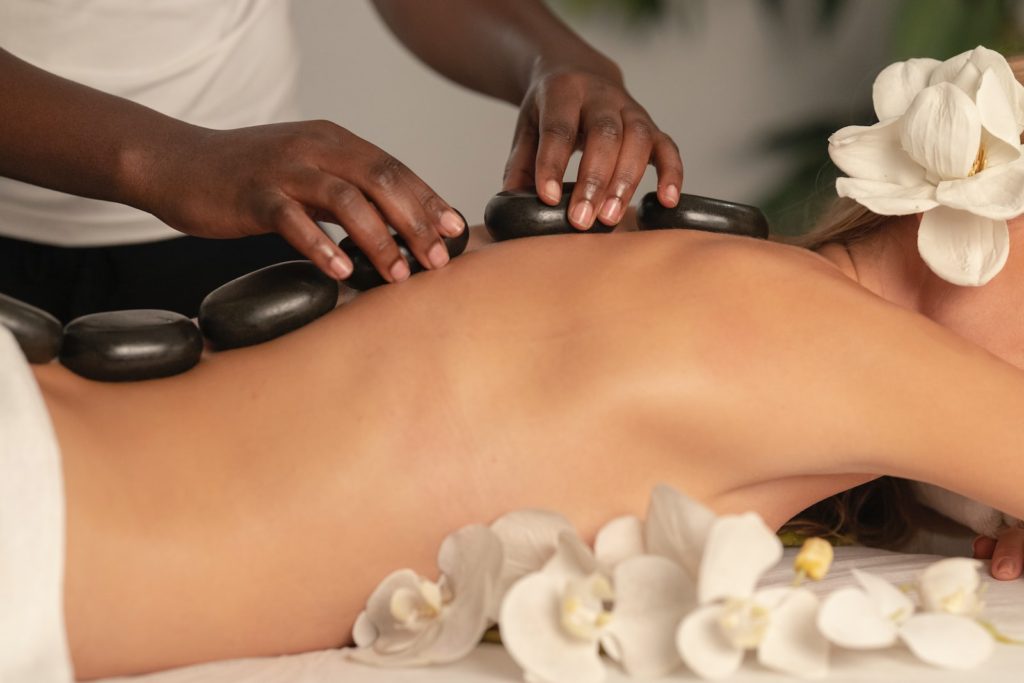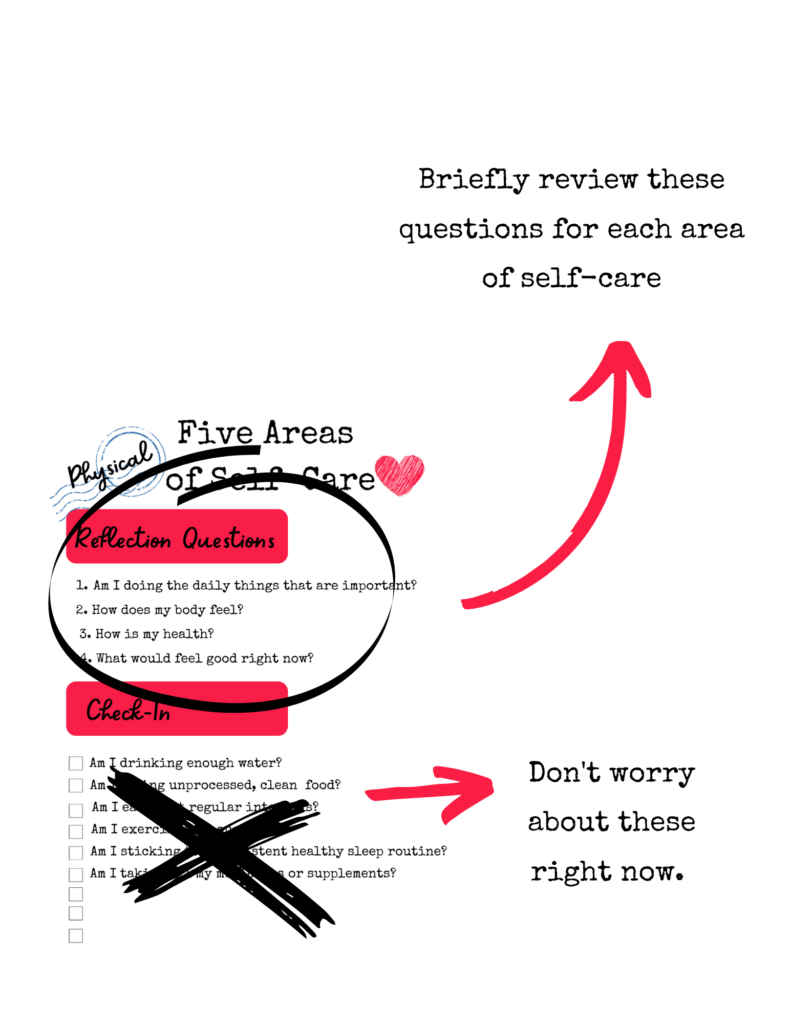Self-Love: How to Do a Self-Care Scan
Do you need to know the difference between self-care and self-love?
There are many articles about the differences between self-care and self-love. The best way I conceptualize self-love and self-care is through this sentence:
Self-care is how you demonstrate self-love.
There is more to it, I know. Self-love is a big concept and growing in self-love is a journey. One that often takes a lifetime. But I think focusing on self-care is a good place to start because it allows you to start paying attention to your relationship with yourself. Whenever I am feeling beat down or worn out, paying attention to my daily routine and self care is a great start to figuring out how I’m not honoring myself and taking care of my own needs.
We all know we must pull down our own oxygen masks before we can take care of others. But what exactly does self-care look like? How do we practice self-care and what are the important things we should do?
The answer? A Self-Care Scan.
A self-care scan. I like to call it a SCS. It’s a practice that will help you mindfully take better care of yourself. It will help you grow in your personal journey towards honoring yourself. And it feels good.

It’s also simple–a key component for scattered minds. And the benefits are worth the few minutes of time it takes.
Before we get to the SCS, let’s consider how to envision self-care so we know what it looks like in our daily lives. After that we’ll dive into a daily routine to keep us all on track towards building something that feeds our body and soul: self-care motivated by self-love.
What Does Self-Care Look Like

I’ve organized self-care into five groups to help us reflect and see where we’re supporting ourselves and to identify areas that require a bit more work. Doing it this way helps me to clearly see that I’m generally strong in my emotional self-care but need some serious help in the physical self-care area. (Exercise and water, anyone?)
Here’s a breakdown of the five areas:
#1–What is Physical Self-Care?

Daily Habits
Physical self-care starts with daily practices that routinely fill our bucket long term. These are the basics of good health that we all know about but that can be hard to consistently do. These simple tasks are some of the most important ones we can do because they sustain our energy, clear our mind, bring us health, and keep our bodies working well. In other words, they collectively make up the physical component of a healthy lifestyle.

This includes things like good sleep hygiene, exercise, eating a whole, balanced diet, stopping to take a deep breath throughout the day, and taking supplements/medicine consistently if needed. This includes going to the doctor and dentist and noticing how our body feels.
When you are showing yourself love in this area you feel good. You may even be amazed that doing the little things your parents (and doctor, husband, etc.) have been telling you are important can make such a profound difference.

Extended Relaxation
Another area of physical self-care are the less routine things we do for ourselves that feel good to our body. This includes luxurious activities like getting a deep tissue massage, bubble baths, enjoying a facial massage, or getting a fancy manicures. It may mean spa days with friends or laying around in bed in your pajamas with a Korean face mask so you can physically unwind and relax.
Ironically, we often turn to these things when we feel stressed but ignore the daily habits that are key to making ourselves feel better. Both are important but the daily habits cannot be ignored if we want our bodies to be taken care of.
#2–What is Emotional Self-Care?
Emotional self-care is so important and one area that I see many women struggle with. Our expectations and runaway negative thoughts can make emotional self-care tough. While I don’t talk specifically about mental illness, taking care of your mental health is certainly an important part of self-care.
Positive Self-Talk
Loving self-talk is a key component of taking care of yourself. Our self-talk makes a difference in how we feel about ourselves and the world around us. We must learn how to be the comforting, soothing, and loving mother we either had or wish we had had.
I don’t know too many people who respond to a loud, critical coach who constantly notices our mistakes, spots our shortcomings, or expects perfection from us. Instead, we need talk that honors our feelings and supports us as we move forward; we need to engage in positive self-talk which fosters positive feelings.

Emotional Awareness
Emotional self-care also involves noticing our emotions, acknowledging them, and letting them run their course. Sometimes we are just going too fast to give any thought to that nagging feeling of doubt or sadness. It’s not healthy to wallow in these emotions but we can see them, note that they are present, and breathe through them.
When we are aware of our feelings it is less likely that we will react to them in ways that hurt us. Mindfulness practices can help us slow down enough to pay attention to the nuances of our emotions.
#3–What is Spiritual Self-Care?
Spiritual self-care differs from person-to-person. I believe it not only encompasses traditional activities that someone might associate with the world spiritual but also relates to things such as living up to your potential and making the most of your gifts.

Connecting to Something Outside Yourself
Being tuned in to someone other than yourself, your needs, your wants, and your desires is part of self-care. This provides us with a reason for living that extends beyond ourselves to something bigger.
The way you connect and tune in to that may involve meditation, prayer, worship, breathing in fresh air out in nature, silence, or prioritizing living in the moment. The belief system that resonates from your spiritual practice often motivates us to spend our resources on activities and purposes that not only make the world better but bring us joy as well.
Good deeds, kindness, love, and generosity are often a result of this. Attending to your spiritual needs provides self-care in the form of inner peace, contentment, and enoughness, a non-word that really deserves a place in the dictionary. 😉

Honoring Your Gifts and Talents
Part of spiritual growth and self-care strategies involve recognizing your strengths so that you can put your time and energy into the activities that you are uniquely suited for. These activities often bring something needed into the world and connect you to a larger creative force as well.
#4–What is Relational Self-Care?
Relational self-care usually involves honesty and vulnerability, two things that are tough for most of us. And for the introverts among us, the internet has made it easier to ignore this aspect of self-care. Yet, relational self-care forces you to share yourself with other people. It provides perspective, empathy, and helps us be more realistic about the world we live in.

Choosing Relationships and Boundaries Well
Relational self-care involves relating to others in ways that honor ourselves as well as the other. This involves choosing to surround ourselves with people who uplift us and support us; it means we prioritize loving relationships.
It involves limiting the negative affect that people who are not-so-positive or are suffering have on us as well.This also involves us setting healthy boundaries so that we don’t allow ourselves to get swept up into taking on things and issues that our not ours to deal with.

Honoring your Need for Connection
Relational self-care also means realizing our need for connection to others and getting that need met. In today’s connected world, this is more important than ever because online connections and in-person connections differ. We show ourselves love by going outside of ourselves to be there for others and allowing others to be there for us. It is a messy affair, involving other people in our most painful and exciting moments, but this connection fulfills a basic human need, as well.
#5–What is Environmental Self-Care?
I don’t know if I would have added environmental self-care to an article like this 20 years ago, but today I think environmental self-care is one of the most overlooked ways that we can show ourselves some serious self love.

Your Space
First, environmental self-care refers to what you surround yourself with. You don’t have to live in a beautiful house filled with roses and designer furniture to take care of yourself. But your surroundings influences how you feel which influences what you think and do.
Think about how differently you feel when you are in a clean hotel room or when your house is all ready for company versus when things are everywhere and you need some serious housekeeping juju.
Whether you realize it or not, you have an important relationship with your space. What does that relationship say?

What You Consume
The second part of environmental self-care involves what you purposely let into your life in the form of entertainment, news, and technology.
I’m not sure any grown woman who has used social media is surprised at the recent research that talks about the negative effects of social media on adolescents. That’s because we feel the impact of what we see and hear almost instantly. And if we don’t feel it right away, pay attention and notice what your thoughts are after reading a frustrating article or looking at something that makes you feel jealous.
Consider how you feel after you’ve binged way too much TV vs spending time reading a book or talking to a friend on the phone.
Technology has found a way to exploit human nature and we must take an active role and set boundaries so that we can coexist well with technology.
There’s a huge difference between technology that improves your life and has a positive effect and technology that motivates negative self-talk or brings out our own worst critics.
Now, there are other areas and specifics we can add to this list. And feel free to do so! You’ll see below that there are opportunities for you to personalize this practice to reflect your definition of self-care.
Let’s Do This–How to Do a Self-Care Scan

We’ve talked about what self-care looks like and positive things you can do to make the concept of self-love more concrete. In other words, improve your self-care to improve your self-love. Take action and see what positive changes result.
It’s easy to let self-care slide when there are so many basic needs we need to meet every single day. A great way to keep yourself committed to consistent self-care is to gently and lovingly reflect on your daily or weekly practices. Reflecting is a good first step towards doing the right things over a long time to invest in your best self.
Path #1–Focus on One Area at a Time
One easy way to make sure you are practicing self-care is to briefly review these questions each day.

At the end of the week, sit down and actually answer the questions in writing. Based on your daily reviews and written answers, identify one area that needs your attention. Then…
Complete the blank checkboxes with any ideas of your own.
Make a copy for each day.
Spend time each day, answering the questions in writing and reflecting on the check-in.
Each day gift yourself the time to take care of yourself in that area.
- Path #2–Flexible Focus
- The other way to approach the self-care scan is a bit more relaxed and agile. It starts with a daily review like Path #1 but this time, include the checklist section.
- Each day, highlight one or two of the checklist items to focus on the next day. You may stick with these highlighted items everyday or you might shift your focus.

- Then, at the end of each week, write down answers to a few questions from each section. From there you can evaluate what your next step is so that you can incorporate more self-care into your life.
- Self-Care Reflection
- Regardless of how you use the SCS, I think you’ll discover that it doesn’t always take huge changes or effort to start reaping the benefits of self-care. Often times the simple things such as eating healthy meals or talking to a close friend regularly mean a big difference on our own journey towards sustainable self-care and more self-love.
- Download the Self-Care checklist and scan below and start taking (even) better care of yourself! Don’t forget: the world needs you!


